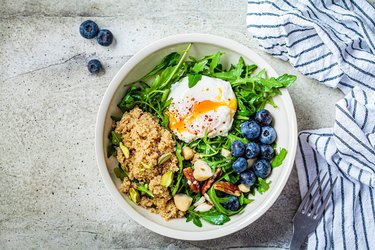
Changing your eating habits can be helpful for managing both gout and diabetes. And because the two conditions often go hand in hand, it's not a bad idea to zero in on a diet that works best for both.
Gout is a type of painful arthritis in which an excess of uric acid builds up in your bloodstream, ultimately forming crystals around your body's joints, according to the Mayo Clinic. But, according to a study in the Annals of the Rheumatic Diseases in January 2016, if you have gout, you may be more likely to develop type 2 diabetes — especially if you're a woman. In fact, the study found that having gout makes women 71 percent more likely to develop type 2 diabetes.
Video of the Day
Video of the Day
About Carbohydrates
According to the Mayo Clinic, choosing the right carbohydrates — including fruits, vegetables and whole grains — can go a long way in helping you manage gout. However, those complex carbs will also help you manage your diabetes, says Rohit Moghe, PharmD, MSPH, pharmacist and certified diabetes care and education specialist in Langhorne, Pennsylvania, and a spokesperson for the Association of Diabetes Care and Education Specialists.
"Carbohydrates sometimes wind up getting a bad rap," Moghe says, adding that not all carbohydrates are the same. "Fiber is a carbohydrate," he says, "and not getting enough fiber can lead to a host of diseases."
Thus, he advises, you should choose a plant-based diet rich in fruits, vegetables and plant proteins to help make sure you're getting enough fiber.
Other Food Factors
According to the Arthritis Foundation, keeping your uric acid levels below 6 milligrams per deciliter (mg/dl) can help lower your chances of having a gout attack. To do so, you can benefit from limiting foods and drinks, like beer and liquor, that are high in purines, which are converted to uric acid in the body.
For a gout diet, according to the Mayo Clinic, you should also avoid food and drink that has added sugar or high-fructose corn syrup. The man-made sweet stuff found in soft drinks and other sugary processed foods is harder on your joints, says the Arthritis Foundation.
Your body also processes it differently. As fructose is broken down in your body, purines are released, explains the Arthritis Foundation. That means that immediately after you consume high-fructose corn syrup, your uric acid levels increase, which can lead to a painful gout attack. Because a gout-healthy diet aims to reduce uric acid in the blood, you should limit sodas and processed foods, the foundation notes.
High-fructose corn syrup is also a no-go for diabetes. According to the Cleveland Clinic, consuming too much of it can lead to insulin resistance. The National Institute of Diabetes and Digestive and Kidney Diseases takes the soda-limiting recommendations for diabetes a step further, advising people with diabetes to choose water over sugary drinks and to select sugar substitutes for coffee and tea.
What About Meat?
If you have gout, a healthy diet also emphasizes lean proteins and low-fat dairy over saturated fats and high-fat animal products, according to the Mayo Clinic. Organ meats like liver contain especially high levels of purines, per the Arthritis Foundation, and can prompt a gout attack. And you should only eat red meats (think beef, venison, bison) occasionally, the foundation advises, as they are higher in purines than their white-meat counterparts.
Moghe notes this diet can help to manage both your diabetes and gout. "Overproduction of uric acid comes from how much we're exposing our bodies to animal food-based diets," he says. "The more we do, the more likely we are to experience gout."
Many of these fatty animal products can also result in high cholesterol, notes the Mayo Clinic, adding that diabetes on its own increases your risk for heart disease and stroke by accelerating the development of clogged and hardened arteries. Accordingly, if you eat too much bacon, for example, it can become a double threat when paired with diabetes.
- Mayo Clinic: “Gout Diet: What’s Allowed, What’s Not”
- Annals of the Rheumatic Diseases: “Independent Impact of Gout on the Risk of Diabetes Mellitus Among Women and Men: A Population-Based, BMI-Matched Cohort Study”
- Rohit Moghe, PharmD, MSPH, ambulatory care and population health clinical pharmacy specialist, St. Mary Medical Center Trinity Health Mid-Atlantic, Langhorne, Pennsylvania; certified diabetes care and education specialist; spokesperson, Association of Diabetes Care & Education Specialists
- Arthritis Foundation: “Fructose and Gout: What’s the Link?”
- Cleveland Clinic: “Avoid the Hidden Dangers of High Fructose Corn Syrup”
- National Institute of Diabetes and Digestive and Kidney Diseases: “Diabetes Diet, Eating, & Physical Activity”
- Arthritis Foundation: “Gout Diet: Dos and Don’ts”
- Mayo Clinic: “Diabetes Diet: Create Your Healthy-Eating Plan”